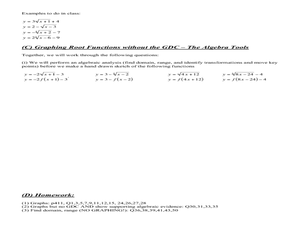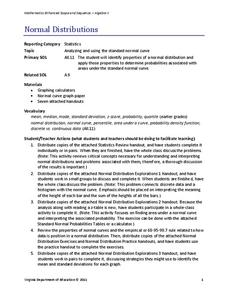Curated OER
How Much are You Worth?
In this body elements worksheet, learners use a table given the percentage of each element that composes the body to find their worth. The value of each element is given and students calculate what their bodies would be worth if they...
Curated OER
Spelling Challenge
For this algebra worksheet, students count and spell out the value of the integer. In this game of spelling, they use algebra to answer the questions of which letters were not ever used. There is an answer key.
Curated OER
Solving Equations by Distributive Property
In this solving equations learning exercise, learners use the distributive property to find the value of the unknown. This one-page learning exercise contains 10 multi-step problems. Answers are provided.
Curated OER
Conversion Factors
In this conversion factors instructional activity, students read word problems, convert them to equations, and compute the answer. They determine the distance between two points and find the cost to travel a predetermined...
Curated OER
Graphing Radical Functions-A Graphic Introduction
In this Algebra II worksheet, 11th graders graph root functions and analyze the domain, range, intercepts, maximum and minimum values, and end behavior. students use that information to transform the graphs of root...
Curated OER
Multiples of Two - Money
A thorough activity for money math beginners, this worksheet prompts students to identify, add, and multiply different coin values in several activities. Note that all coins are in British Currency, but can possibly be modified for...
Simply Worksheets
Math in the Car - Easy
For this car math instructional activity, students play games of math in the car involving license plates, speed signs, and more. Students complete 4 problems.
Simply Worksheets
Math in the Car - Hard
In this car math games instructional activity, students play car math games about license plates, speed, and numbers. Students play 3 games.
EngageNY
Interpreting Correlation
Is 0.56 stronger than -0.78? Interpret the correlation coefficient as the strength and direction of a linear relationship between two variables. An algebra lesson introduces the correlation coefficient by estimating and then...
EngageNY
Describing the Center of a Distribution
So the mean is not always the best center? By working through this exploratory activity, the class comes to realize that depending upon the shape of a distribution, different centers should be chosen. Learners continue to explore...
EngageNY
From Ratio Tables, Equations and Double Number Line Diagrams to Plots on the Coordinate Plane
Represent ratios using a variety of methods. Classmates combine the representations of ratios previously learned with the coordinate plane. Using ratio tables, equations, double number lines, and ordered pairs to represent...
Willow Tree
Dimensional Analysis
Convey to your pupils the importance of units, then show how to use dimensional analysis to perform a unit conversion. The math lesson includes detailed worked-out solutions to guide learners in their practice.
Bob Prior
The Order of Operations
Your learners use many different number representations like positive and negative integers, exponents, radicals, and combinations of operations as they learn and strengthen their use of the order of operations. Thoughtfully organized to...
EngageNY
Logarithms—How Many Digits Do You Need?
Forget your ID number? Your pupils learn to use logarithms to determine the number of digits or characters necessary to create individual ID numbers for all members of a group.
Virginia Department of Education
Normal Distributions
Pupils work to find probabilities by using areas under the normal curve. Groups work to calculate z-scores and solve real-world problems using the empirical rule or tables.
Federal Reserve Bank
Cash Flow and Balance Sheets
What is your car worth? How much do you owe? Individuals create their personal cash flow and balance sheets. They learn the difference between an asset and liability using their personal information to complete the activity.
Virginia Department of Education
Composition of Functions
Analyze functions by decomposing complex functions and composing simple functions. Through a detailed lesson plan, pupils learn the vocabulary and notation related to the composition of functions. Practice includes both evaluating and...
EngageNY
Getting the Job Done—Speed, Work, and Measurement Units II
How fast is your class? Learners determine the amount of time it takes individuals to walk a given distance and calculate their speeds. Pupils solve distance, rate, and time problems using the formula and pay attention to the...
EngageNY
The Mean Absolute Deviation (MAD)
Is there a way to measure variability? The ninth resource in a series of 22 introduces mean absolute deviation, a measure of variability. Pupils learn how to determine the measure based upon its name, then they use the mean...
University of Utah
Rational and Irrational Numbers
Conquer any irrational fears you might have of irrational numbers. As class members investigate how to represent numbers geometrically, they learn about rational and irrational numbers, including approximating and ordering rational...
Lorain County Community College
Solving Linear Equations
Put your mathematicians to the test and see if they can solve this worksheet full of multi-step equations with rational numbers. Add, subtract, multiply, and divide with fractions and decimals to solve for x. The top of the worksheet has...
Rational Number Project
Initial Fraction Ideas: Lesson 3
Visual models support young mathematicians as they deepen their fractional number sense in this elementary math activity. Using fraction circle manipulatives, children explore basic unit fractions as they develop the...
Teacher Writing Center
Thanksgiving Lesson
Practice using proper verb tenses in the spirit of Thanksgiving! Learners are given holiday photographs as prompts to create oral and written sentences in a targeted verb tense.
Charleston School District
Identifying Irrational Numbers
These numbers have some personality! Are they rational or irrational? The lesson examines the definitions of rational and irrational numbers and shows examples of how to identify them.
Other popular searches
- Music Note Values
- Beginning Music Note Values
- Musical Note Values
- Rhythm & Note Values
- Teaching Note Values
- Note Values in Music
- Learning Note Values
- Note Values Worksheet
- Sixteenth Note Values
- Reading Music Note Values
- Note Values and Rhythm
- Dotted Note Values























